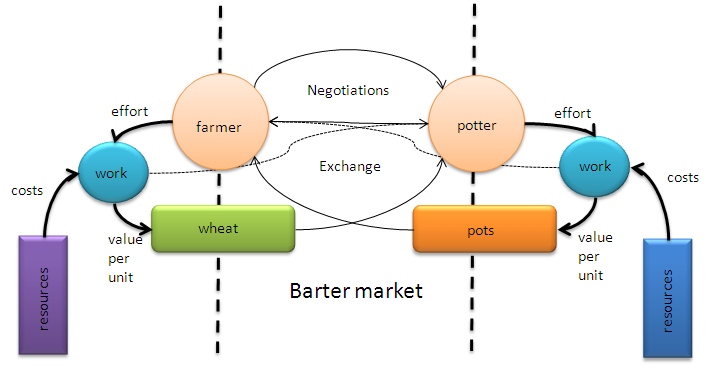If you can read this article you can sell your house without using a realtor. I’m doing it now and its taken 2-4 hours a week to keep the sale on track. Selling without using a realtor will save you 4-7% on the sale price. The median priced home in the US in 2008 is $212,400. A 4-7% commission on the sale is $8500- $15,000! That’s a lot of money. How long would it take you to save $15K after you pay your mortgage, food, clothing, children’s school, insurance, car payments, income taxes, state taxes and pizza on Fridays? This is the story of what I did to sell my own house; how it happened, what worked, and what didn’t. I’ll tell you what I would do differently the next time, problems that had to be solved and tips I would offer other sellers who want to sell their house without using a realtor.
Worse Time to Sell, Ever!
There has never been a worse time to sell a house than now (10/8/2008). Truth be told: I had the ability to avoid selling at the wrong time, but, got caught for reasons beyond the scope of this article. I’m not complaining: At least I was able to sell, to find the buyer myself and for what I know to be the highest price possible. The excess inventory of houses on the market is huge, prices are down 30% and the average house is on the market for 11.2 months before being sold or taken off the market. What made the process harder for me was the constantly falling prices throughout the sale. If I can sell a house in this market, without a realtor, from three thousand miles away without even showing up for the closing then every seller has good reason to be optimistic.
Help-U-Sell Wouldn’t Return My Calls
The first thing I did was look for a company I saw on 60 minutes called Redfin. I liked their philosophy on breaking out realtor services into parts and giving the seller the option of choosing which services they wanted. Since I was selling from a distance I thought paying for the help would be a wise tradeoff. There were no Redfin offices in Boca Raton, Florida. So, I looked for a local Help-U-Sell since they break out their services, too. My wife used them to sell her house in California and had a good experience. She believes it saved her a lot by using them instead of a old-school realtor. They added her to the MLS, advised her on price, did several open houses which eventually produced a buyer. My first call to Help-U-Sell was not returned. My second phone call to Help-U-Sell was not returned. My friend David called a third time and they didn’t return his call, either. This is what lit my fuse and got me thinking about selling it myself. If they won’t return my calls maybe they won’t return calls from potential buyers, either? And after my wifes experience I didn’t want to have to pay the whole 6% commission to an old-school realtor.
Brief Summary of My Sale
I live in California and will be closing on the sale of my house in Florida, this week. I hired a friend to prepare the house for the sale, set the price, found the buyer, arranged for a Title Company to handle the escrow and the paperwork and will not be present at the closing. The title company is sending all the documents to me in California to perform what they call a ‘mailaway’ closing. I’m not bragging. It’s a description of what happened. My friend David spent two weeks at the property preparing the house, painting, putting up the sign, hanging a lockbox on the door, gathering info on the local market and fixing up the kitchen and bathroom. Excluding David’s work, its taken 2-4 hours per week to find the buyer and keep the sale on track.
The Steps
These are the steps you’ll be going through to sell your house:
- Preparing the House
- Setting the Price
- Finding a Buyer
- Negotiating the Details
- Doing the Paperwork
- Solving Problems
- Closing
If you’re like me you may think you need a realtor to help with every step. What I’m going to explain in this article is that realtors help you mostly with Step 3.: Finding a Buyer. I was worried about all the paperwork. All those contracts, disclosures and escrow forms. Don’t realtors handle all that? No, they don’t. The Title company does. Your realtor just calls one and turns it over to them. You can call one, just as easily. They make the paperwork a breeze. You have to manage all the other steps, anyway, whether you use a realtor or not. With a little extra effort you can find your own buyer (Step 3), too. If you do, you’ll be paid handsomely by saving yourself a large commission. To put it another way: Finding a buyer is the most expensive part of the process to outsource.
Warning: This Article Could Be a Book
Some books have one thing to say and take a book to say it. This article has a books worth of things to say and will take an article to say it. Update: I did have to make this article into a book. It grew to ~20,000 words and is now a mini-book. I’ll post a few more thousands words, here, and you can download the book, for free … A web search reveals that people have written books about this subject. I haven’t read them, so, can’t vouch for them. Searching Google turns up many articles about this topic. I found these articles to be encouraging, but, not conclusive. They don’t seem to be written by actual sellers who went through the whole process of selling their own house. The next time you search for articles you’ll find this one. Problem solved. The goals for this article are:
- To document and guide you through every aspect of one sale: My own.
- To be complete enough that you could make a decision to use, or not use a realtor for your own sale.
I’ll be as brief as the subject allows. When you’re selling your own house it won’t seem too long. Hopefully, it will be saving you time, effort and some money, too.
Terminology
A broker holds the licence for a Real Estate office. They are the only legal party eligible to receive the entire commission. It is harder to become a broker than an agent in that there are more tests involved and more legal requirements to keep the license active. An agent works for a broker and receives a percentage of the commission for conducting the sale. A realtor could be either an agent or a broker. This article will use the term Realtor, in most cases. It does’nt matter whether you’re working with an agent or a broker. They’re both realtors and, therefore, working for a commission.
Real Estate Commissions – The Last Dinosaur
The internet has destroyed or brought into the new millennium every commission known to man. Every commission, that is, except for what realtors take for connecting sellers with buyers.
Realtors Make More than Architects?
My brother was an architect. Architects earn one of the hardest BS degrees taking five years of college, not four. When they graduate they spend 5 years preparing for the boards. During that dues paying period they make half as much as a good waitress. When they finally get their board certification they still have to work another five years for another architect because its so difficult to establish a practice. Yet another another 5-year dues-paying phase. Architects design, draw, code, change, every aspect of material and space and attend to every imaginable detail to bring a building into existence. Their exposure to liability is insane to the point that many can’t afford the insurance. If an architect does manage to have his own practice the costs to run the practice dwarf those of a brokers office. What’s the architects commission on a building after this lifetime of preparation, exposure to liability and detailed work on the building, itself? Six percent. That’s right, the same commission a broker gets. How would you compare what an architect does for a building to what a realtor does for it? How would you compare the cost of education and training of an architect to that of a broker? Case closed. I’m not criticizing Realtors, agents or brokers. I’m criticizing the size of their commission. It’s disproportionately large for what they do compared to an architects work on the same building. How much work does it take you to earn the money your about to turn over to the realtor for finding a buyer?
The Biggest Deal of Your Life
Selling your house is the largest deal most people will ever do. Optimizing the 6-7% commission on that transaction should be a priority. I say ‘optimize’ instead of save because, if you do pay a commission, you should get the best service you can and pay only for the services you get. Many people would say they want to use a realtor because it’s the biggest deal of their life. After all, if you pay 7% to an agent that’s still leaves 93%. If you feel this way I still think you should try selling yourself for the first 30-days.
What About the Other Transaction Costs?
Can you save on them, too? Yes. But, why talk about them before you’ve gone after your biggest cost? The other transaction costs pale in comparison.
DIY, Not!
Just because I want to save the 6% commission to a Realtor doesn’t mean I want to conduct the whole sale, myself. No, thank you! These two things are not the same thing. Enlisting the talents of other people is a smart thing to do. And its a brilliant thing to do when selling your own house. I received (And paid for) an extensive amount of help on each step of the process. Several things motivated me to attempt the sale without using a Realtor:
- My opportunity cost is currently low.
- I’ve read a lot on the subject and am familiar with the process.
- I’m an experienced buyer, but not seller.
- I wanted to see if saving the 6% commission was possible.
- I have another house for sale and could save 6% on that one, too.
- If successful I could write this article and help others save a chunk of money in bad economic times.
And, like I said above, Help-U-Sell wouldn’t return my calls. Too bad for them.
Real Estate Expert, Not!
The subject of Real Estate is vast. One could devote a lifetime to all the various aspects to become an expert. Even then, a true expert would have to specialize because there are so many fields of knowledge involved. So, what?! I didn’t have to be an expert to sell my house, expertly. And, neither do you. A mere play on words? Not in my case. I’m selling a house, not running a business or a career. I suspect my perspective is more useful to other sellers because I’m not an expert. You don’t need to be an expert to have each step of your sale be expertly done.
Don’t Become an Agent
Becoming an agent to sell your own house is like “Burning down a house to make toast”. Total overkill. Not needed. In fact, being an agent is probably a liability, see below. Don’t become an agent just to sell your house.
Liability, Not an Asset
In 2002 I studied to become a real estate broker. I enjoy the subject, read all the prep material and thought about taking the tests. But, working as a broker or agent did not fit my personality so there was little point in getting the license. One of the things I learned is there’s a downside to being an broker: They’re held to a higher legal standard of performance. In practice, this means you’re exposed to more legal liabilities because its easier to accuse you of negligence if you have a license proving competence. So, why not just be competent without a license? I’m more interested in having knowledge and understanding than in having a license saying I do. Dishonesty at any stage of selling a house is more likely to blow the deal than anything. But, the law can often be an ass. Let it be an ass to someone else. Don’t get me wrong: I’m not claiming to know as much as a broker or an agent. They have their focus and I have mine. Theirs is to run a business and earn commissions. Mine is to sell my house for the optimal price and keep as much of the proceeds of the sale as possible. Those two areas of focus are not the same.
John T. Reed – Thumbs Up
Much more helpful than reading the material for the brokers license was reading John T. Reed’s books on the subject of Real Estate. I read all 20 of them and they’re the best survey of the field of Real Estate I’ve ever found. Each of his books describe a different aspect of Real Estate mostly for the benefit of investors, specifically. However, taken in total, the reader is given a practical overview of the subject like no other. What’s great about John’s writing is his readability when writing about a complex subject. He will tell you in two pages what would take another author an entire chapter if they had the knowledge to say it. In my opinion that makes John an expert’s expert. Although I highly recommend all of John’s Real Estate books I don’t think reading them is a prerequisite to sell your house without using a realtor. However, there is no doubt that you’ll do a better job of it if you do. You’ll have to decide that based on your goals and time available. It should go without saying that the cost of buying all of his books is nothing compared to the deal you’re trying to optimize. (Note: This article is a report from the battlefield of my sale. Don’t blame John for mistakes I made and write about in this article. At some point, we all have to stop reading and start doing. I read until I was blue in the face and still made mistakes. That’s just the way it goes when you’re in the ring and have to get the job done. Rest assured I made less mistakes, and lost less money, by learning from others experience and writings.)
How Do You Handle a Hungry Realtor?
By understanding what they do, what they charge, how they talk and what motivates them. You may even end up hiring one. If you do I hope you’ll be able to put their role in perspective and limit their service to the help you need to conduct the sale.
Realtors Want Speed, Not Price
Brokers use price when deciding what state, region, city, neighborhood or type of property to specialize in selling. After that its all about speed. Any broker in their right mind values speed over price. Brokers make more money if they sell more houses in less time. Even if they’re only selling one house it’s a better use of their time to sell it quickly. No problem, so far. Why tell you the obvious you may be wondering. Because the higher the price the slower the sale. In fact, if you know the fair market value (FMV) for your house and take 5% off that price John T. Reed refers to it as the ‘Quick Sale Price’. Its called that because you can sell it within a week if the market is efficient.
Doesn’t Higher Price Means More for Them?
Sure, their commission, based on percentage, goes up with the price. But, the amount the commission goes up as the price rises is small compared to the commission on the whole deal. Sure they’re supposed to represent your interests and a lot of that is getting the highest price possible. But advising you on the highest price you can get will almost always add time to the length of the sale. That may be ok with you, but, it is not in the realtors best interest. Even worse, setting too high a price is the most common reason for a deal not going through, at all. And setting the price, even for the ‘experts’ is not an exact science. Why take any risk at all, the realtor may conclude. I’m not making a blanket accusation of realtors, here. I’m merely pointing out there’s a natural tension between getting the highest price you can and the time it takes to sell. And you should know that the realtor cares a lot more about speed than you do about price. There’s little to no incentive for the buyer or sellers broker to hold out for a higher price. A realtor will probably tell you if what you’re asking for is too low for the area. But, its more likely a broker will need to talk a seller down in price. Some of that may be to correctly adjust a sellers unrealistic expectations, fine. However, be on the lookout for the suggestion being offered merely to increase the speed of the sale. If it is, make sure that’s what you want to accomplish. Unfortunately, its always to the brokers advantage to lower the price . . . to increase the speed.
6-7% and The Seller Pays It All
Realtors say they only charge 3%. But, there are two realtors: The buyers and the sellers. They each charge 3%. That makes realtor fees 6%. Most of the time the seller pays it all. The marketplace has decided the seller has more to gain from the sale than the buyer. I don’t like that, but, it makes sense when you realize the seller has one house to sell and the buyer has many houses to choose from. Why would a buyer pay broker fees if they can buy the same or similar house and negotiate those fees away? This has become standard behavior so sellers know they have to pay all the broker fees and most of the other closing costs, as well. The exceptions to this are when the buyer doesn’t have competing choices for the house or has decided they must have a particular house. Any situation that would inspire these feelings in the buyer have the potential for the seller to get the buyer to share in the broker fees.
Do I Have to Pay the Buyers Broker?
Not, at all. But, don’t blow a good deal over it. Even if you don’t use a realtor you may get a call from a realtor who has ‘found’ you a buyer. As with all people interested in your house I recommend you show it to them.
Don’t Let Them Screen You
Don’t let the buyers realtor screen your position on paying their commission before they show their buyer the house. If they don’t like what you say they may not show their buyer your house even if your house is perfect for their buyer. This would be a violation of their ethical code as a realtor. But, I don’t recommend you risk losing a buyer for your house by relying on their broker adhering to their own ethical code. On the initial phone call just tell them the truth: You’re willing to consider any offer, agreeable to all parties, that will make the sale go through.
Your Options
If their buyer is interested in making an offer you have the following options for paying the commission to the buyers broker:
- Recommend the buyer pay since the buyer benefited from their service.
- Agree to pay them a commission, but, you only pay X% to buying brokers.
- Tell them you’ll pay if the buyer increases the sales price (Same as buyer pays).
- Don’t pay them and leave the choice to the buyer (Probably resulting in splitting it).
It’s possible the buyer signed a contract with their broker. That’s got nothing to do with you. Don’t interfere with a contract the buyer may have signed with his broker. In other words, you have options, but not obligations, if a realtor shows up and wants money from you for a buyer.
Offers to Help With the Sale
When they find out you’re not using a realtor they may offer to help you conduct the sale in exchange for a commission. You should already be prepared to handle the sale, yourself. Tell them no thank you. They have enough to do helping their buyer find a house, a loan and guiding them through the sale. You’ve already got a Title company handling everything and don’t require assistance.
Be Prepared For Intimidation Tactics
You may get all sorts of intimidating advice from Realtors, at this point. All of it is aimed at trying to get you to use a realtor instead of finding a buyer yourself:
- They may threaten to ‘take away’ their buyer (Which violates their professional obligation to act for the benefit of their buyer).
- They may imply you’re a fool and know nothing about real estate and should let the experts handle it.
- They may claim you’ll never sell the house if its not on the MLS, which they can generously put you on (For 3%).
- They may throw escrow terms around in the hopes that you’ll be intimidated.
- They may try to confuse you on the steps of the process.
Hopefully, you’ve read my entire article by then and don’t fall for any of it.
Divide and Conquer
This is how ‘experts’ do it: They talk fast and confidently, using terms you havn’t heard, about a subject that’s new to you. Your wife, or you, get nervous and says, “Maybe we should stick with the professionals”. The remainder of the conversation is you pitting your instinct up against their ‘expertise’ on a subject you haven’t yet studied. Even if you ‘win’ the argument they change the subject and say another misleading 50 words to start over again. Since you’re going with instinct and it appears the agent is going with ‘facts’ you get in an argument with your wife because she wants to go with the ‘experts’ because the deal involves so much money. I truly hope this article helps you with that situation. I will give you one example, and how I would handle it, below. However, I can’t address everything that may come up. If you do decide to talk with a realtor I recommend studying up on all the potential things that might come up before the meeting. Especially if your meeting as a couple. Why not print out a copy of this article for your wife? Heck, at the very least you can show the realtor this article and say, “Why can’t I do what this guy did?”. Maybe it will change the subject into a service you might want to purchase from the realtor. Something costing less than their entire 3%, I would hope.
One Example and How I Would Handle It
Here’s one example of the kind of misleading advice brokers give out. Its from an article on the web written by a Realtor named Elizabeth Weintraub on about.com. The title of the article is Who Pays the Real Estate Commission? How Does an Agent Get Paid? Elizabeth writes: “It can be argued and, quite rightfully so, that the buyer always pays the commission. Why? Because it’s typically part of the sales price. If the seller did not sign an agreement to pay a commission, the sales price might have been lowered. And therein lies the appeal of buying homes through unrepresented sellers because, given the same logic, those prices should reflect a net sales price without a commission. But those sellers haven’t quite figured this out yet which causes potential buyers of those listings to be consistently disappointed.” Ms. Weintraub’s advice is wrong, misleading, insulting to sellers and meant to intimidate potential buyers and sellers of FSBO (For Sale By Owner) properties. Let me explain why: (Note: This concludes the excerpt from Chapter One of the e-book, “How To Sell Your House Without Using A Realtor”. It grew to ~20,000 words and is now a mini-book. You can download it, for free, from McGillespie Free Resource Library.)






